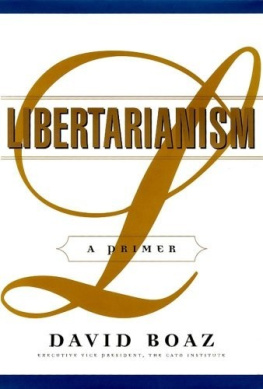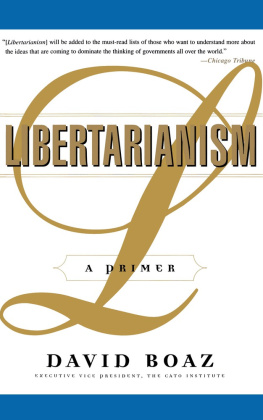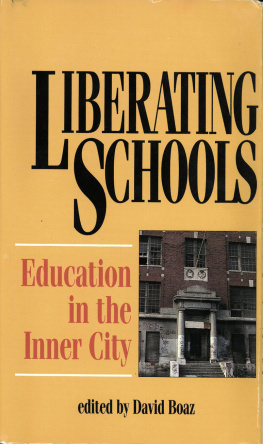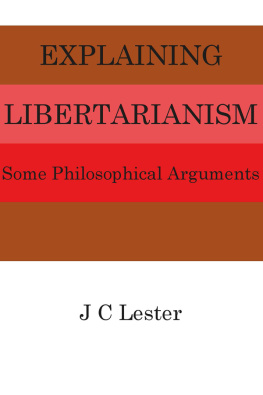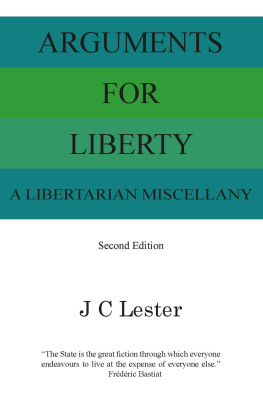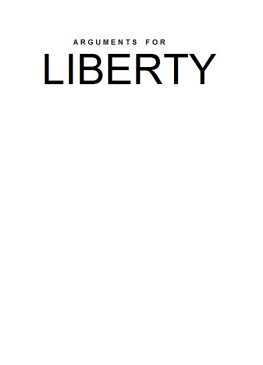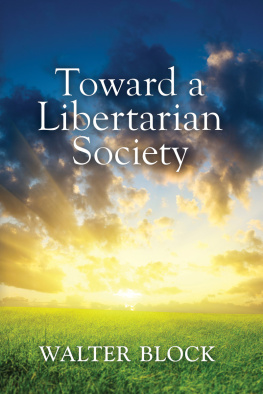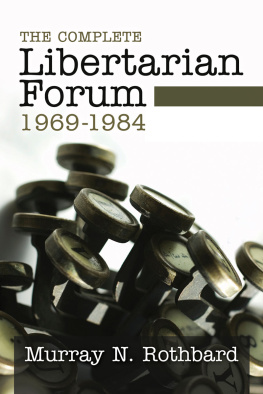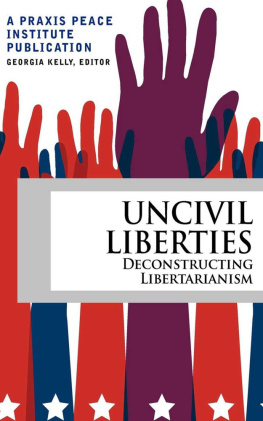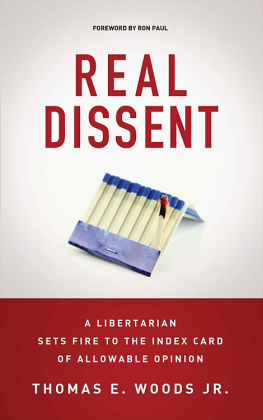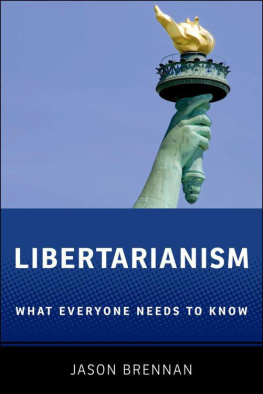


THE FREE PRESS
A Division of Simon & Schuster Inc.
1230 Avenue of the Americas
New York, NY 10020
www.SimonandSchuster.comCopyright 1997 by David Boaz
All rights reserved,
including the right of reproduction
in whole or in part in any form.First Paperback Edition 1998THE FREE PRESS and colophon are trademarks
of Simon & Schuster Inc.Manufactured in the United States of America
10 9 8 7 6 5 4 3 2 1 Library of Congress Cataloging-in-Publication Data Boaz, David, 1953-Libertarianism: a primer / by David Boaz.p. cm.Includes bibliographical references and index.ISBN 0-684-83198-8ISBN 978-0-684-84768-9eISBN 978-1-439-19515-40-684-84768-X (Pbk)1. Libertarianism. I. Title.JC585.B559 1997320.512dc20 96-46012
CIP
CONTENTS
Chapter
THE COMING LIBERTARIAN AGE
In 1995 Gallup pollsters found that 39 percent of Americans said that the federal government has become so large and powerful that it poses an immediate threat to the rights and freedoms of ordinary citizens. Pollsters couldnt believe it, so they tried again, taking out the word immediate. This time 52 percent of Americans agreed.Later that year USA Today reported in a front-page story on post-baby-boom Americans that many of the 41 million members of Generation X are turning to an old philosophy that suddenly seems new: libertarianism. A front-page report in the Wall Street Journal agreed: Much of the angry sentiment coursing through [voters] veins today isnt traditionally Republican or even conservative. Its libertarian. Because of their growing disdain for government, more and more Americans appear to be driftingoften unwittinglytoward a libertarian philosophy.Writing in 1995 about the large numbers of Americans who say theyd welcome a third party, David Broder of the Washington Post commented,The distinguishing characteristic of these potential independent votersaside from their disillusionment with Washington politicians of both partiesis their libertarian streak. They are skeptical of the Democrats because they identify them with big government. They are wary of the Republicans because of the growing influence within the GOP of the religious right.Where did this sudden media interest in libertarianism come from? As USA Today noted, libertarianism challenges the conventional wisdom and rejects outmoded statist ideas, so it often has a strong appeal to young people. As for myself, when I first discovered libertarian ideas in my college days, it seemed obvious to me that most libertarians would be young (even though I was dimly aware that the libertarian books I was reading were written by older people). Who but a young person could believe in such a robust vision of individual freedom? When I went to my first libertarian event off-campus, I was mildly surprised that the first person I encountered was about forty, which seemed quite old to me at the time. Then another person arrived, more the sort of person I had expected to meet, a young woman in her late twenties. But her first question was, Have you seen my parents? I soon learned that her sixtyish parents were the leading libertarian activists in the state, and my mistaken impressions about what kind of people would become libertarians were gone forever. I discovered that the young womans parents, and the millions of Americans who today share libertarian beliefs, stand firmly in a long American tradition of individual liberty and opposition to coercive government.Libertarianism is the view that each person has the right to live his life in any way he chooses so long as he respects the equal rights of others. (Throughout this book I use the traditional he and his to refer to all individuals, male and female; unless the context indicates otherwise, he and his should be understood to refer to both men and women.) Libertarians defend each persons right to life, liberty, and propertyrights that people possess naturally, before governments are created. In the libertarian view, all human relationships should be voluntary; the only actions that should be forbidden by law are those that involve the initiation of force against those who have not themselves used forceactions like murder, rape, robbery, kidnapping, and fraud.Most people habitually believe in and live by this code of ethics. Libertarians believe this code should be applied consistentlyand specifically, that it should be applied to actions by governments as well as by individuals. Governments should exist to protect rights, to protect us from others who might use force against us. When governments use force against people who have not violated the rights of others, then governments themselves become rights violators. Thus libertarians condemn such government actions as censorship, the draft, price controls, confiscation of property, and regulation of our personal and economic lives.Put so starkly, the libertarian vision may sound otherworldly, like a doctrine for a universe of angels that never was and never will be. Surely, in todays messy and often unpleasant world, government must do a great deal? But heres the surprise: The answer is no. In fact, the more messy and modern the world, the better libertarianism works comparedfor instancewith monarchy, dictatorship, and even postwar American-style welfarism. The political awakening in America today is first and foremost the realization that libertarianism is not a relic of the past. It is a philosophymore, a pragmatic planfor the future. In American politics it is the leading edgenot a backlash, but a vanguard.Libertarian thought is so widespread today, and the American government has become so bloated and ludicrous, that the two funniest writers in America are both libertarians. P. J. ORourke summed up his political philosophy this way: Giving money and power to government is like giving whiskey and car keys to teenage boys. Dave Barry understands government about as clearly as Tom Paine did: The best way to understand this whole issue is to look at what the government does: it takes money from some people, keeps a bunch of it, and gives the rest to other people.Libertarianism is an old philosophy, but its framework for liberty under law and economic progress makes it especially suited for the dynamic worldcall it the Information Age, or the Third Wave, or the Third Industrial Revolutionwe are now entering.The Resurgence of LibertarianismSome readers may well wonder why people in a generally free and prosperous country like the United States need to adopt a new philosophy of government. Arent we doing reasonably well with our current system? We do indeed have a society that has brought unprecedented prosperity to a larger number of people than ever before. But we face problemsfrom high taxes to poor schools to racial tensions to environmental destructionthat our current approach is not handling adequately. Libertarianism has solutions to those problems, as Ill try to demonstrate. For now Ill offer three reasons that libertarianism is the right approach for America on the eve of the new millennium.First, we are not nearly as prosperous as we could be. If our economy were growing at the rate it grew from 1945 to 1973, our gross domestic product would be 40 percent larger than it is. But that comparison doesnt give the true picture of the economic harm that excessive government is doing to us. In a world of global markets and accelerating technological change, we shouldnt be growing at the same pace we did forty years agowe should be growing faster. More reliance on markets and individual enterprise would mean more wealth for all of us, which is especially important for those who have the least today.Second, our government has become far too powerful, and it increasingly threatens our freedomas those 52 percent of Americans told the befuddled pollsters. Government taxes too much, regulates too much, interferes too much. Politicians from Jesse Helms to Jesse Jackson seek to impose their own moral agenda on 250 million Americans. Events like the assault on the Branch Davidians, the shootings of Vicki Weaver and Donald Scott, the beating of Rodney King, and the governments increasing attempts to take private property without judicial process make us fear an out-of-control government and remind us of the need to reestablish strict limits on power.Third, in a fast-changing world where every individual will have unprecedented access to information, centralized bureaucracies and coercive regulations just wont be able to keep up with the real economy. The existence of global capital markets means that investors wont be held hostage by national governments and their confiscatory tax systems. New opportunities for telecommuting will mean that more and more workers will also have the ability to flee high taxes and other intrusive government policies. Prosperous nations in the twenty-first century will be those that attract productive people. We need a limited government to usher in an unlimited future.The twentieth century has been the century of state power, from Hitler and Stalin to the totalitarian states behind the Iron Curtain, from dictatorships across Africa to the bureaucratic welfare states of North America and Western Europe. Many people assume that as time goes on, and the world becomes more complex, governments naturally get bigger and more powerful. In fact, however, the twentieth century was in many ways a detour from the 2,500-year history of the Western world. From the time of the Greeks, the history of the West has largely been a story of increasing freedom, with a progressively limited role for coercive and arbitrary government.Today, at the end of the twentieth century, there are signs that we may be returning to the path of limiting government and increasing liberty. With the collapse of communism, there is hardly any support left for central planning. Third World countries are privatizing state industries and freeing up markets. Practicing capitalism, the Pacific Rim countries have moved from poverty to world economic leadership in a generation.In the United States, the bureaucratic leviathan is threatened by a resurgence of the libertarian ideas upon which the country was founded. We are witnessing a breakdown of all the cherished beliefs of the welfare-warfare state. Americans have seen the failure of big government. They learned in the 1960s that governments wage unwinnable wars, spy on their domestic opponents, and lie about it. They learned in the 1970s that government management of the economy leads to inflation, unemployment, and stagnation. They learned in the 1980s that governments cost and intrusiveness grew even as a succession of presidents ran against Washington and promised to change it. Now in the 1990s they are ready to apply those lessons, to make the twenty-first century not the century of the state but the century of the free individual.These changes have two principal roots. One is the growing recognition by people around the world of the tyranny and inefficiency inherent in state planning. The other is the growth of a political movement rooted in ideas, particularly the ideas of libertarianism. As E. J. Dionne, Jr., writes in Why Americans Hate Politics, The resurgence of libertarianism was one of the less noted but most remarkable developments of recent years. During the 1970s and 1980s, antiwar, antiauthoritarian, antigovernment, and antitax feelings came together to revive a long-stagnant political tendency.Why is there a libertarian revival now? The main reason is that the alternatives to libertarianismfascism, communism, socialism, the welfare statehave all been tried in the twentieth century and have all failed to produce peace, prosperity, and freedom.Fascism, as exemplified in Mussolinis Italy and Hitlers Germany, was the first to go. Its economic centralization and racial collectivism now seem repellent to every civilized person, so we may forget that before World War II many Western intellectuals admired the new forms of economic organization in Germany and Italy, as the magazine the Nation put it in 1934. The worlds horror at National Socialism in Germany helped produce not only the civil rights movement but such harbingers of the libertarian renaissance as The God of the Machine by Isabel Paterson and The Road to Serfdom by Friedrich A. Hayek.The other great totalitarian system of the twentieth century was communism, as outlined by Karl Marx and implemented in the Soviet Union and its satellites. Communism maintained its appeal to idealists far longer than fascism. At least until the revelations of Stalins purges in the 1950s, many American intellectuals viewed communism as a noble if sometimes excessive attempt to eliminate the inequalities and alienation of capitalism. As late as the 1980s, some American economists continued to praise the Soviet Union for its supposed economic growth and efficiencyright up to the systems collapse, in fact.When communism suddenly imploded in 198991, libertarians were not surprised. Communism, they had argued for years, was not only inimical to human freedom and dignity but devastatingly inefficient, and its inefficiency would only get worse over time, while the capitalist world progressed. The collapse of communism had a profound impact on the ideological landscape of the entire world: It virtually eliminated full-blown socialism as one end point of the ideological debate. Its obvious now that total statism is a total disaster, leading more and more people to wonder why a society would want to implement some socialism if full socialism is so catastrophic.But what about the welfare states of the West? The remaining ideological battles may be relatively narrow, but they are still important. Shouldnt government temper the market? Arent the welfare states more humane than libertarian states would be? Although Western Europe and the United States never tried complete socialism, such concerns did cause government control of peoples economic lives to increase dramatically during the twentieth century. European governments nationalized more industries and created more state monopolies than the United States did; airlines, telephone companies, coal mines, steel manufacturers, automobile producers, and radio and television broadcasters were among the major industries that were generally private in the United States but stateowned in Western Europe. European countries also established earlier and more comprehensive cradle-to-grave government benefits programs.In the United States, few industries were nationalized (the railroads Conrail and Amtrak were among the few), but regulation and restriction of economic choices grew throughout the century. And while we have not quite created a European system of social insurance, we do have transfer payments ranging from the Women, Infants, and Children (WIC) program to Head Start to college loans to unemployment compensation and welfare to Social Security and Medicarea pretty good start on cradle-to-grave government.Yet today, all over the developed world, welfare states are faltering. The tax rates necessary to sustain the massive transfer programs are crippling Western economies. Dependence on government has devalued family, work, and thrift. From Germany to Sweden to Australia the promises of the welfare state can no longer be kept.In the United States, Social Security will start running deficits by 2012only fifteen years from nowand will be out of money by 2029. Official projections show that Medicare will be out of money as early as 2001 and will be running a deficit of $443 billion by 2006. Economists calculate that an American born in 1975 would have to pay 82 percent of his lifetime income in taxes to keep entitlement programs going, which is why young people are balking at the prospect of working most of their lives to pay for transfer programs that will eventually go bankrupt anyway. A 1994 poll found that 63 percent of Americans between eighteen and thirty-four dont believe Social Security will exist by the time they retire; more of them (46 percent) believe in UFOs than in Social Security (28 percent).Getting out of the welfare state is going to be a tricky economic and political problem, but more and more peoplein the United States and elsewhererecognize that Western-style big government is going through a slow-motion version of communisms collapse.Economic growth slowed down dramatically in the United States and Europe in the early 1970s. Various explanations have been offered for this phenomenon; the most compelling, I would argue, is that the burden of taxes and regulation increased substantially during the 1960s. The number of pages in the Federal Register, where new regulations are printed, doubled between 1957 and 1967, then tripled between 1970 and 1975. Great Britain, which had higher taxes and more socialism than the United States, suffered even more. It was the richest country in the world in the nineteenth century, but by the 1970s its economic stagnation and national malaise were known worldwide as the British disease.These sorts of problems led to the elections of Margaret Thatcher as prime minister of Great Britain in 1979 and Ronald Reagan as president of the United States in 1980. Thatcher and Reagan were unlike previous leaders of their respective parties. Rather than manage the welfare state a little more efficiently than the Labour and Democratic parties, they promised to roll back socialism in Britain and high taxes in the United States. Their programs were by no means consistently libertarian, but their elections did indicate that voters were growing uncomfortable with the economic burden of big government.Unfortunately, neither Reagan nor Thatcher, despite the length of their tenure in office, did much to slow down the growth of the welfare state. Thatcher did privatize quite a few nationalized industries, including British Airways, the telephone company, public housing, and the Jaguar automobile company. But she made little headway against the middle-class entitlement state, and government spending as a percentage of GNP was not reduced. Reagan arguably accomplished even less in the economic arena. He cut income tax rates but then raised payroll taxes to preserve the cornerstone of the welfare state, Social Security. The percentage of national income going to government transfer payments kept on rising.There was some evidence during the 1980s that a country actually had to run smack into welfare-state bankruptcy before reform would be possible. The greatest success story was not Thatchers Britain or Reagans America but New Zealand, whose corporatist and paternalist welfare state had run out of money. Ironically, it was the Labour Party government of Prime Minister David Lange and Finance Minister Roger Douglas that stripped away business-coddling tariffs, reduced taxes, trimmed middle-class welfare, and explored ideas like parental choice in education. According to a worldwide index of economic freedom, New Zealand soared from a dismal 4.9 out of 10 in 1985 to 9.1, the third highest rating in the world, by 1995. Chile and Argentina, two other especially profligate welfare states, also hit bottom and made major reforms in the 1990s. As in New Zealand, the reforms in Argentina came from a surprising source, President Carlos Menem of the Peronist party, which had from the 1940s to the 1970s implemented popular welfarist programs that took Argentina from one of the worlds richest countries to a poor country with a bankrupt government.The Disillusionment with PoliticsThe inability of Western governments to deliver on their promises of prosperity, security, and social justicealong with the less than successful attempts at reformhas led to a profound disillusionment with the political class throughout the West. The historian Paul Johnson wrote in his book Modern Times, Disillusionment with socialism and other forms of collectivism was only one aspect of a much wider loss of faith in the state as an agency of benevolence. The state was the great gainer of the twentieth century; and the central failure. Whereas, at the time of the Versailles Treaty, most intelligent people believed that an enlarged state could increase the sum total of human happiness, by the 1980s the view was held by no one outside a small, diminishing and dispirited band of zealots. The experiment had been tried in innumerable ways; and it had failed in nearly all of them. The state had proved itself an insatiable spender, an unrivalled waster. Indeed, in the twentieth century it had also proved itself the great killer of all time.By the 1990s the political leaders in every major Western country had fallen to unprecedented lows in popularity. In the United States, it can be argued that in every presidential election since 1968 the voters have chosen the candidate who seemed to offer the greatest prospect of smaller government. Yet the largest and most complex government in history has remained virtually impervious to the publics desire for reduction of its size and power. (Note that I am certainly not claiming that the United States government is the most oppressive ever; far from it. I do think its fair to say, however, that this government commands more resources, dispenses more favors, and promulgates more rules and regulations than any other.) By 1993 the publics dissatisfaction was starkly captured in a Gallup Poll. Gallup regularly asks people how much confidence they have in the federal government. The number has steadily fallen since the mid-1960s, with periodic ups and downs. Unsurprisingly, it reached a low in 1974, at the end of Richard Nixons disastrous presidency. It rose a bit and then fell even lower during the last year of Jimmy Carters inept administration. It rose with the initial enthusiasm for Ronald Reagans promised revolution and then resumed its fall untilremarkablyit reached an all-time low in January 1993, as Bill Clinton assumed the presidency. Never before had public confidence in government been so low at the beginning of a presidency. No wonder there was so little popular enthusiasm for Clintons ambitious program of government activism: a tax increase, an economic stimulus program, national youth service, and of course his massively complicated plan to effectively nationalize medical care.Other poll results confirmed the popular alienation from government. To the question, Which do you favor, a smaller government with fewer services or a larger government with many services? the percentage responding smaller government rose from 49 in 1984 to 60 in 1993 to 68 in 1995. (Note that the question doesnt even remind people that more services mean more taxes.) Another regular poll question asks, How much of the time do you think you can trust the government in Washington to do what is right? In 1964, 14 percent said always and 62 percent said most of the time. By 1994, always had virtually disappeared, and most of the time was down to 14 percent. Only some of the time had risen from 22 percent to 73 percent, while 9 percent volunteered the response of never. Given all that, its no surprise that by mid-1995 the number of voters expressing support for creating a third party had risen to 62 percent.Michael Ledeen of the American Enterprise Institute argues that throughout the cold war voters in the West figured they had to stick with their ruling classes to avoid a far worse fate. But in the 1990s, the external threat having collapsed, the people are ready to reclaim control over their destiny.Those people realize, at least intuitively, that the Age of Politics has failed to make good on its promises. They are ready for a political philosophy and a political movement that can explain why politics failed and what can replace it.Why Politics FailsMuch of this book will be devoted to examining the problems with coercive government, and the libertarian alternative. Here Ill offer just a brief introduction. The real problem in the United States is the same one being recognized all over the world: too much government. The bigger the government, the bigger the failure; thus state socialism was the most obvious failed policy. As libertarians warned throughout the twentieth century, socialism and other attempts to replace individual decision making with government solutions took away the freedom and dignity of the individualthe goal for which so many battles in Western civilization had been fought. Socialism also faced several insurmountable political and economic problems:The totalitarian problem, that such a concentration of power would be an irresistible temptation to abuseThe incentive problem, the lack of inducement for individuals to work hard or efficientlyThe least understood, the calculation problem, the inability of a socialist system, without prices or markets, to allocate resources according to consumer preferencesFor decades libertarian economists such as F. A. Hayek and Ludwig von Mises insisted that socialism simply couldnt work, couldnt effectively utilize all the resources and knowledge of a great society to serve consumers. And for decades social democrats in the West dismissed those claims, arguing that not only was Soviet communism surviving, its economy was growing faster than the economies of the West.The social democrats were wrong. Although the clumsy Soviet economy could produce large quantities of low-grade steel and concreteit practiced what the Hungarian-born philosopher Michael Polanyi called conspicuous productionand even put men in space, it never managed to produce anything that consumers wanted. By the late 1980s the Soviet economy was not two-thirds the size of the U.S. economy, as the CIA estimated; it did not make full use of its manpower, as the Harvard University economist John Kenneth Galbraith said; it was not a powerful engine for economic growth, as Nobel laureate Paul Samuelsons textbook told generations of college students. It was, in fact, about 10 percent the size of the U.S. economy, as nearly as such disparate things can be compared, and it made grossly inefficient use of the educated Soviet workforce. A failure in the industrial age, it was a dinosaur in the information age, a fact obvious to everyoneexcept Western intellectualswho visited the USSR.Government intervention into society and markets in the United States suffers from the same problems, albeit in weaker form. Power always corrupts, and the power of government to tell people how to live their lives or to transfer money from those who earn it to others is always a temptation to corruption. Taxes and regulations reduce peoples incentive to produce wealth, and government transfer programs reduce the incentive to work, to save, and to help family and friends in case of sickness, disability, or retirement. And though U.S. bureaucrats dont make the gross errors that socialist planners did, it is nonetheless clear that government enterprises are less efficient, less innovative, and more wasteful than private firms. Just compare the U.S. Postal Service with Federal Express. Or compare what its like to call American Express versus the IRS to correct problems. Or compare a private apartment building with public housing. People who dont own property dont take care of it as well as owners; people who dont have their own money invested in an enterprise and wont make a profit by its success will never innovate, serve customers, and cut costs as well as profit-seeking entrepreneurs.In his book The Affluent Society, Galbraith observed private opulence and public squalorthat is, a society in which privately owned resources were generally clean, efficient, well maintained, and improving in quality, while public spaces were dirty, overcrowded, and unsafeand concluded, oddly enough, that we ought to move more resources into the public sector. This book suggests a different conclusion.Basic Political ChoicesFor centuries people have argued about the basic issues of politics and government. According to Aristotle, the possible political systems were tyranny, aristocracy, oligarchy, and democracy. In the middle of the twentieth century, it seemed to many that the choices were communism, fascism, and democratic capitalism. Today, all those choices have fallen from favor except democratic capitalism, and many intellectuals have embraced Francis Fukuyamas proclamation of the end of history, meaning that the great battles over ideology have ended with the triumph of mixed-economy democracy. Even as his book appeared, however, Islamic fundamentalism was rising in one part of the world, and some Asian political leaders and intellectuals were beginning to develop a positive argument for a form of authoritarian capitalism they dubbed Asian values.In any case, the supposed triumph of democracy still leaves much room for contending ideologies. Even the identification of democracy as the Western alternative to fascism and socialism is problematic. Libertarians, as the name implies, believe that the most important political value is liberty, not democracy. Many modern readers may wonder, whats the difference? Arent liberty and democracy the same thing? Certainly one could get that idea from the standard teaching of American history. But consider: India is the worlds largest democracy, yet its commitment to free speech and pluralism is weak and its citizens are enmeshed in a web of protectionist regulations that limit their liberty at every turn. For the past several decades, Hong Kong has not been a democracyits citizens have had no right to vote for their rulersyet it has afforded more scope for individual choice and freedom than any other place in the world. There is a connection between liberty and democracy, but they are not identical. As my friend Ross Levatter says, if we lived in a society where everyones spouse was chosen by majority vote of the entire community, wed live in a democracy but we wouldnt have much liberty.Much of the confusion stems from two different senses of the word liberty, a distinction notably explored by the nineteenth-century French libertarian Benjamin Constant in an essay titled The Liberty of the Ancients Compared with That of the Moderns. Constant noted that to the ancient Greek writers the idea of liberty meant the right to participate in public life, in making decisions for the entire community. Thus Athens was a free polity because all the citizensthat is, all the free, adult, Athenian mencould go to the arena and participate in the decisionmaking process. Socrates, indeed, was free because he could participate in the collective decision to execute him for his heretical opinions. The modern concept of liberty, however, emphasizes the right of individuals to live as they choose, to speak and worship freely, to own property, to engage in commerce, to be free from arbitrary arrest or detentionin Constants words, to come and go without permission, and without having to account for their motives and undertakings. A government based on the participation of the governed is a valuable safeguard for individual rights, but liberty itself is the right to make choices and to pursue projects of ones own choosing.For libertarians, the basic political issue is the relationship of the individual to the state. What rights do individuals have (if any)? What form of government (if any) will best protect those rights? What powers should government have? What demands may individuals make on one another through the mechanism of government?As Edward H. Crane of the Cato Institute puts it, there are only two basic ways to organize society: coercively, through government dictates, or voluntarily, through the myriad interactions among individuals and private associations. All the various political ismsmonarchy, oligarchy, fascism, communism, conservatism, liberalism, libertarianismboil down to a single question: Who is going to make the decision about this particular aspect of your life, you or somebody else?Do you spend the money you earn, or does Congress?Do you pick the school your child goes to, or does the school board?Do you decide what drugs to take when youre sick, or does the Food and Drug Administration in Washington?In a civil society, you make the choices about your life. In a political society, someone else makes those choices. And because people naturally resist letting others make important choices for them, the political society is of necessity based on coercion. Throughout this book well explore the implications of this analysis.Key Concepts of LibertarianismWith that background in mind, I want to spell out some of the key concepts of libertarianism, themes that will recur throughout this book. These themes have developed over many centuries. The first inklings of them can be found in ancient China, Greece, and Israel; they began to be developed into something resembling modern libertarian philosophy in the work of such seventeenth- and eighteenth-century thinkers as John Locke, David Hume, Adam Smith, Thomas Jefferson, and Thomas Paine. Individualism. Libertarians see the individual as the basic unit of social analysis. Only individuals make choices and are responsible for their actions. Libertarian thought emphasizes the dignity of each individual, which entails both rights and responsibility. The progressive extension of dignity to more peopleto women, to people of different religions and different racesis one of the great libertarian triumphs of the Western world. Individual Rights. Because individuals are moral agents, they have a right to be secure in their life, liberty, and property. These rights are not granted by government or by society; they are inherent in the nature of human beings. It is intuitively right that individuals enjoy the security of such rights; the burden of explanation should lie with those who would take rights away. Spontaneous Order. A great degree of order in society is necessary for individuals to survive and flourish. Its easy to assume that order must be imposed by a central authority, the way we impose order on a stamp collection or a football team. The great insight of libertarian social analysis is that order in society arises spontaneously, out of the actions of thousands or millions of individuals who coordinate their actions with those of others in order to achieve their purposes. Over human history, we have gradually opted for more freedom and yet managed to develop a complex society with intricate organization. The most important institutions in human societylanguage, law, money, and marketsall developed spontaneously, without central direction. Civil societythe complex network of associations and connections among peopleis another example of spontaneous order; the associations within civil society are formed for a purpose, but civil society itself is not an organization and does not have a purpose of its own. The Rule of Law. Libertarianism is not libertinism or hedonism. It is not a claim that people can do anything they want to, and nobody else can say anything. Rather, libertarianism proposes a society of liberty under law, in which individuals are free to pursue their own lives so long as they respect the equal rights of others. The rule of law means that individuals are governed by generally applicable and spontaneously developed legal rules, not by arbitrary commands; and that those rules should protect the freedom of individuals to pursue happiness in their own ways, not aim at any particular result or outcome. Limited Government. To protect rights, individuals form governments. But government is a dangerous institution. Libertarians have a great antipathy to concentrated power, for as Lord Acton said, Power tends to corrupt and absolute power corrupts absolutely. Thus they want to divide and limit power, and that means especially to limit government, generally through a written constitution enumerating and limiting the powers that the people delegate to government. Limited government is the basic political implication of libertarianism, and libertarians point to the historical fact that it was the dispersion of power in Europemore than other parts of the worldthat led to individual liberty and sustained economic growth. Free Markets. To survive and to flourish, individuals need to engage in economic activity. The right to property entails the right to exchange property by mutual agreement. Free markets are the economic system of free individuals, and they are necessary to create wealth. Libertarians believe that people will be both freer and more prosperous if government intervention in peoples economic choices is minimized. The Virtue of Production. Much of the impetus for libertarianism in the seventeenth century was a reaction against monarchs and aristocrats who lived off the productive labor of other people. Libertarians defended the right of people to keep the fruits of their labor. This effort developed into a respect for the dignity of work and production and especially for the growing middle class, who were looked down upon by aristocrats. Libertarians developed a pre-Marxist class analysis that divided society into two basic classes: those who produced wealth and those who took it by force from others. Thomas Paine, for instance, wrote, There are two distinct classes of men in the nation, those who pay taxes, and those who receive and live upon the taxes. Similarly, Jefferson wrote in 1824, We have more machinery of government than is necessary, too many parasites living on the labor of the industrious. Modern libertarians defend the right of productive people to keep what they earn, against a new class of politicians and bureaucrats who would seize their earnings to transfer them to nonproducers. Natural Harmony of Interests. Libertarians believe that there is a natural harmony of interests among peaceful, productive people in a just society. One persons individual planswhich may involve getting a job, starting a business, buying a house, and so onmay conflict with the plans of others, so the market makes many of us change our plans. But we all prosper from the operation of the free market, and there are no necessary conflicts between farmers and merchants, manufacturers and importers. Only when government begins to hand out rewards on the basis of political pressure do we find ourselves involved in group conflict, pushed to organize and contend with other groups for a piece of political power. Peace. Libertarians have always battled the age-old scourge of war. They understood that war brought death and destruction on a grand scale, disrupted family and economic life, and put more power in the hands of the ruling classwhich might explain why the rulers did not always share the popular sentiment for peace. Free men and women, of course, have often had to defend their own societies against foreign threats; but throughout history, war has usually been the common enemy of peaceful, productive people on all sides of the conflict.These themes will be explored and developed throughout this book. It may be appropriate to acknowledge at this point the readers likely suspicion that libertarianism seems to be just the standard framework of modern thoughtindividualism, private property, capitalism, equality under the law. Indeed, after centuries of intellectual, political, and sometimes violent struggle, these core libertarian principles have become the basic structure of modern political thought and of modern government, at least in the West and increasingly in other parts of the world. However, three additional points need to be made: First, libertarianism is not just these broad liberal principles. Libertarianism applies these principles fully and consistently, far more so than most modern thinkers and certainly more so than any modern government. Second, while our society remains generally based on equal rights and capitalism, every day new exceptions to those principles are carved out in Washington and in Albany, Sacramento, and Austin (not to mention London, Bonn, Tokyo, and elsewhere). Each new government directive takes a little bit of our freedom, and we should think carefully before giving up any liberty. Third, liberal society is resilient; it can withstand many burdens and continue to flourish; but it is not infinitely resilient. Those who claim to believe in liberal principles but advocate more and more confiscation of the wealth created by productive people, more and more restrictions on voluntary interaction, more and more exceptions to property rights and the rule of law, more and more transfer of power from society to state, are unwittingly engaged in the ultimately deadly undermining of civilization.Left or Right?In modern American political discourse, we want to assign everyone a place along a spectrum labeled left to right, liberal to conservative. So is libertarianism left or right? Well, lets consider what those terms mean. The American Heritage Dictionary says that liberals favor progress and reform, while conservatives favor the preservation of the existing order and regard proposals for change with distrust. The Random House Dictionary says that people on the left advocate liberal reform usually on behalf of greater personal freedom or improved social conditions, while those on the right advocate maintenance of the existing social, political, or economic order, sometimes by authoritarian means. Well, if those are my choices, Ill take left. But then, by these standards, could we call, say, Ronald Reagan and Newt Gingrich conservatives? Havent they supported significant changes in American government, which they believed would be reform and would improve social conditions? These definitions dont seem to tell us much about modern American politics.Some political science textbooks display political ideologies along a left-right spectrum, such as this:
Next page



